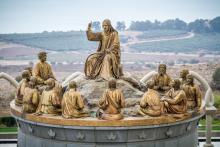Lent

On the surface, the confluence of Valentines and ashes seems to produce an odd and uncomfortable couple, but it’s fitting to have one day of celebrating love in all its forms while also recognizing our mortality.
Love and dust? There’s no better pairing.

It’s because of the tendency to forget our First Love — to rely on emotions and feelings instead of true sacrifice and commitment — that we need Ash Wednesday this Valentine’s Day.

THIS MONTH SEES several liturgical transitions. Epiphany, the season of light and revelation, comes to a close. Jesus’ transfiguration is its own epiphany. The church enters the season of Lent, beginning with a focus on human frailty and failure—and for many people an evening (or week) of indulgence in things that bring joy, pleasure, and sweetness. The light is still there, but we are peering more intently at the shadows.
The opening prayer for Ash Wednesday in The Book of Common Prayer begins, “Almighty and everlasting God, you hate nothing you have made and forgive the sins of all who are penitent.” The readings for the first week present the God whose power and splendor in creation is only matched by her care for her children. The radiance of the transfiguration also shines a light on the ways in which we are not like Jesus, yet he chooses to leave the mount of illumination and return to the world that needs his light. The readings for the third week attend to the world God has made, calling us to care for it in partnership with God. And on the final Sunday, Jesus teaches about his death and resurrection, the greatest transition in the scriptures.

Can Christians observe Lent in a way that ties social justice consciousness to spiritual Lenten practices of repentance, resistance, and solidarity? The curators of four social media campaigns — #LentenLament, #LentLite, #EmbodiedSolidarity, and #DetoxifyChristianity — are exploring what this looks like in public. “What does it mean to come together, to lock arms together, to really just stand in the gap for people?” Alicia Crosby, executive director of the Center for Inclusivity and co-curator of last year’s #EmbodiedSolidarity campaign, asked.

It would be much easier to let the face of the tomb be a scriptural story, so we could talk about terror and grief at arm’s length. But if we strip the story of humanity, we have no recourse but to fall into Christian platitudes that have no resilience in the face of real pain and grief.

I thought about my own will to division — how I was inclined to cut out from my circle of care those who, it seemed to me, had chosen to elect leaders who relish division, scapegoating, dog whistling, and control. I thought about our Buddhist siblings’ reminder that there is no separation between these hatreds — that to choose division myself is to cut out a part of our general body that is central to the compassion and fierce love through which lasting change comes.

For now, me and my people are protected in America. My tears are fortified by fear and outrage as I think of my Catholic cousin and the wonderful woman he married, whose family hails from India and who practices another religion. They and their two beautiful children could be targeted like Srinivas Kuchibhotla — for what? The color of their skin? The worship of their God?

Unplugging from social media or limiting one’s internet use for a set period such as during Lent can be helpful for some individuals. My research, conducted over two decades, however, shows that some core assumptions on which digital fasting is based can be problematic or misguided.

Scripture is rife with paradox. Live by the Spirit but be firmly anchored in the Word. Seek justice but love mercy. Love sacrificially but maintain healthy boundaries. Be gracious with people but hold to the standard of holiness.

We’re telling ourselves, our neighbors, and this country that we care about the everyday lives of the people, that we’re willing to work to protect them. We’re willing to care for the environment when we recycle and dig in the dirt and support our national parks, we’re willing to protest in the streets when we see injustice, and we’re willing to pray in our homes that the resistance-heart and hard-working hands of Jesus bleeds into who we are in every moment of our lives.

If our fasting from food does not compel us to consider and improve the circumstances of those who are hungry and fast involuntarily, then what purpose does it serve? If our abstaining from shopping for clothes does not cause us to consider and provide for the naked, and if our desire to improve our interpersonal relationships doesn’t catalyze our engagement with those on the margins, how does this season of sacrifice serve the building of God’s kingdom on earth as it is in heaven?

To adults new to Christian practices of fasting during Lent, the idea can seem facetious — some sort of trendy way of worshipping both Jesus and our own well-defined abs. But for many, fasting has been a way of cleansing not the body but the mind. Temporary self-denial can invite us to compassion for those who are hungry not by choice, to a remembrance of the trials of Jesus, or to better appreciation of food when we do eat. But in the face of a world that already pressures many into self-denial, self-deprivation, and self-harm, the strength of the spiritual discipline of fasting cracks.

Suffering far outlasts any administration, and our commitment to the needs of those suffering must transcend partisanship. One problem with connecting advocacy to partisan political outrage is that often the needs of the people get lost in the desire to “win.” Jesus’s vision of healing a world in pain begins with blessing, not blame, so that we may keep our focus on those in need of comfort.

For many Christians who observe the liturgical season of Advent, leading up to Christmas, an Advent devotional is a beloved companion.
Such devotionals typically include a short Scripture reading and reflection on the birth of Jesus.
But most are “crap,” according to the Rev. Jason Chesnut of Baltimore.

Late October is a time of colorful festivals around the world. Some mark the harvest, others are festivals of lights. Now, and in the coming weeks, Hindus, Jews, Buddhists, and Yoruba are celebrating different holidays, explained here and shown in the photo essay below.

I like to call Ramadan a personal spiritual boot camp. One not only fasts but also prays more, is more careful of one’s interactions with others, tries to exhibit more patience and love. The hunger and thirst — even the overall sense of exhaustion one feels by the end of each day — is a fuel that pushes a Muslim to do better, to fight the internal impulses towards negativity and sin, and to become a better person. Is that possible without fasting? Maybe. But with fasting it is definitely probable. By the end of the 30 days of Ramadan, one feels invigorated, nearer to God, and somehow optimistic.

Loving others isn’t something we do as an act of charity. It’s an imitation…a celebration of the love we’ve known in the death of Jesus for our sakes. He spent himself, and we are to spend ourselves for our neighbours.

What if the hardest thing in my spiritual life is to accept the abundant life that Jesus promises? What if the biggest challenge, for some of us who struggle with the sins of self-loathing and shame, is to receive love and to feel joy? Could—should— penitence look different? Might it mean wallowing less and embracing more?

Without his community of his sisters and family, who have been mourning his death and questioning God for not saving their brother and friend, Lazarus would remain entombed. Without community, we remain bound and entombed. I’m not saying that our actions are as great as Jesus raising someone from the dead. But I am saying that God entrusts us with living into community, so that we may welcome our brothers and sisters out of death and into life.

Here is what Pope Francis said to the world in his Lenten message:
“Indifference to our neighbor and to God also represents a real temptation for us Christians. Each year during Lent we need to hear once more the voice of the prophets who cry out and trouble our conscience.”
Instead of giving up chocolate or alcohol for Lent, the pope seems to want us to give up our indifference to others.